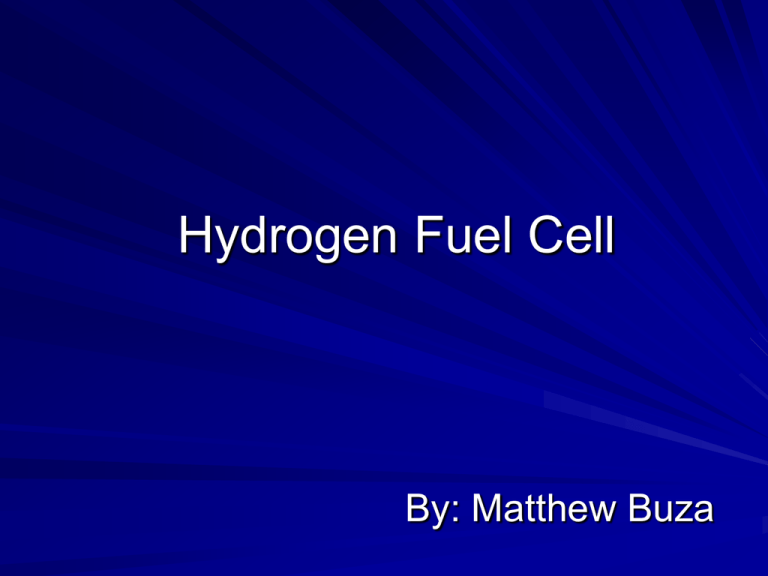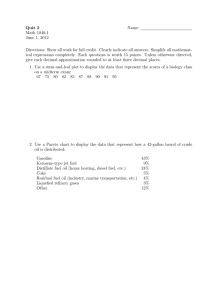MBuzaTalk4.ppt
advertisement

Hydrogen Fuel Cell By: Matthew Buza Time for a Change Whats wrong with what we have now? What are the alternatives? The benefits with developing Hydrogen Fuel Cells, and what good will it bring. What exactly is a hydrogen fuel cell. Breakdown of specific systems, the details behind the magic. What are the commercial applications of these systems. How they will work to help us in the future. When its your Time? We have come to the realization that oil and petroleum energy sources have to go, including coal. Problem is that the infrastructure is set for petroleum resources, and stubborn to change. Third world nations are nowhere near changing from the cheap and easy oil energy sources. Not in their interest. Money and time will be needed to change this, major effort must be taken by whole world. President Bush, call for alternative fuels and specifically fuel cells. Problems? Main problem is the pollution of greenhouse gases. Causing destruction to the o-zone. Problems with greenhouse effects and global warming. And rising sea levels. Human Health, with asthma, lung and repertory problems, possible connection with illness, and speculation of cancer. What alternatives do we have? Nuclear Power: Most efficient, lots of energy, with little waste. Problem: the waste is very dangerous, public fear. Solar Power: Cheaper, good amounts of energy, long life, no waste. Problem: Too big to be practical, too many for large scale use. Wind-Turbine: Little to no danger with use, good amount of energy Problem: Too many to be effective, unsightly, subject to weather. Fuel Cells: Powerful, simple design, transferable (size), lots of power, waste is water, lots of development with government and NASA. Problem: save transfer of hydrogen. Why Fuel Cells? Termed the “Micro chip of the energy industry” Reasonable to expect almost every power producing device in the world to be replaced by fuel cell devices in the next 50-80 years. Market potential is in the Trillions for such an endeavor. Two important Advantages of fuel cells is that they produce no pollution emissions or greenhouse gases, do not require supplies of foreign oil. Needs Hydrogen and Oxygen, and emits water. Biologically Friendly, Slow down the pollution, and begin to change the destruction. What is a Hydrogen Fuel Cell? A Fuel Cell is an Electrochemical device that produces electricity. That’s Right it’s a BATTERY!!! Unlike a battery the reaction is sustained as long as the cell is being supplied by fuel. The reaction happens at relatively low temperatures, and no combustion takes place in the fuel cell. In the Fuel cell the hydrogen is the primary fuel. When the hydrogen is introduced a chemical reaction between hydrogen and air produces electricity, pure water and some heat. The electricity is driven through a motor which powers your device. The electricity comes back to form the water with the H+ ions and the oxygen. Types of Fuel Cells Phosphoric Acid: very popular in commercial use today Motlen Carbonate (MCFC): liquid solution of lithium, sodium, and/or potassium carbonates. Promise is high efficiency, but high temps. Alkaline: Widely used in military and NASA. Every mission from Gemini to now, has this type of fuel cell on it for water/ electricity PEM (Proton Exchange Membrane): Operates at low temperatures, and has a very high power density. Can vary power output quickly to meet power demands – – – – good for light duty vehicles, buildings, and possibly rechargeable batteries. Membrane is a thin plastic sheet that allows the H+ ions to flow through. Membrane is coated on both sides by dispersed metal alloy, (Platinum). Electrolyte is a solid organic polymer, helps with corrosion, and management problems. The Hydrogen Fuel Cycle Anode: H2(g) -> 2H+(aq) + 2eCathode: ½O2(g) + 2H+(aq) + 2e- -> H2O(l) What can it be used for? The Fuel Cell produces electricity directly from hydrogen fuel, it can be used for anything that uses power in the form of electricity, rotary power or heat. They can be made to be small enough to power a cellular phone or large enough to power a town. The benefit is that the design of the system does not change. Therefore the markets for fuel cells is virtually unlimited. Challenges ahead. The cost to make the systems, the cost of development and adaptation. The catalysts require expensive precious-metal catalysts, and others need to be resistant to very high temperatures. Durability and Dependability, the high temperatures cells are prone to breakdown, need efective water management systems to operate efficiently. Fuel Issues: – – – – Production Delivery Storage Saftey Public Acceptance, and consumer embrace of the products.


